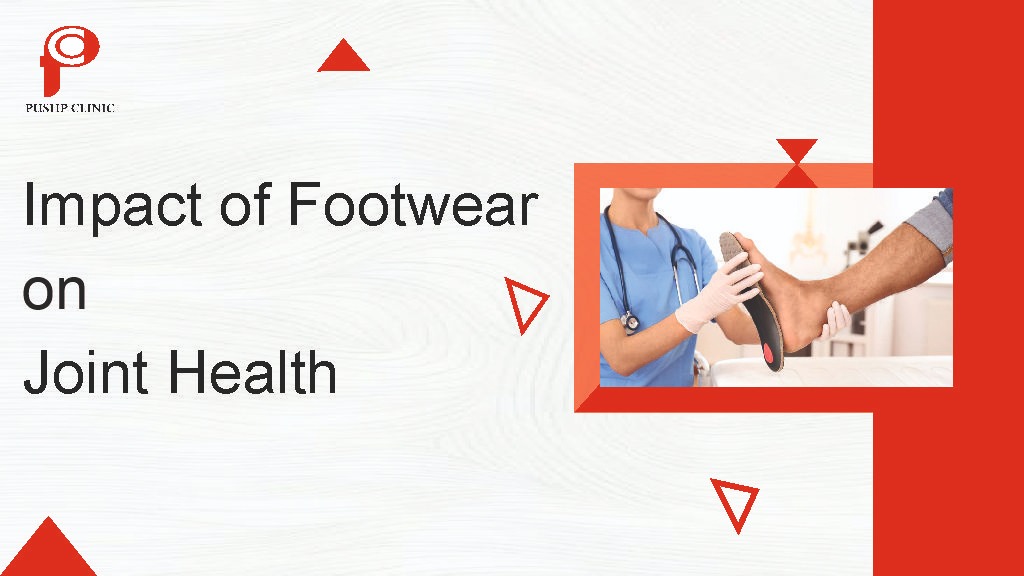Most people think shoes are only about comfort and looks. Some even buy shoes just because they look trendy. But very few think, “Will these shoes affect my knees or back?”
The truth is, footwear is not just about style. The kind of shoes you wear every day makes a big difference to your joint health. Your knees, hips, and even your spine carry your full body weight. Every step you take creates pressure on them. If the footwear is good, this pressure is reduced. If the footwear is wrong, it increases stress on joints.
Over time, wrong shoes can cause pain, stiffness, and posture issues. That is why doctors and physiotherapists often say — “Choose your shoes wisely, they decide how your joints feel in the long run.”
The Connection Between Footwear and Joints
Shoes are like shock absorbers for your body. The right shoes reduce the impact every time your foot touches the ground. Let’s understand how:
- Shock Absorption: When you walk or run, a force travels from your feet to your knees and hips. Shoes with proper cushioning absorb most of this shock.
- Pressure Distribution: Good footwear spreads your body weight evenly across the foot. This prevents extra stress on your knees and back.
- Posture Balance: Shoes also decide how you stand and walk. Wrong shoes change your gait (walking style), which slowly harms your joints.
So yes, footwear is directly linked with joint health.
Common Footwear Mistakes That Harm Joints
High Heels
High heels may look stylish but they are not joint-friendly. They push your body weight forward, putting stress on your knees and lower back. Continuous use can lead to knee joint stress and spine problems.
Flat Shoes Without Support
Some people think flat shoes are comfortable. But shoes without arch support create new problems. Over time, they may cause arch collapse, ankle strain, and knee pain.
Tight or Ill-Fitting Shoes
Wearing tight shoes daily affects blood circulation and walking style. Your gait changes, which puts uneven pressure on your hips and knees.
Old Worn-Out Shoes
Shoes lose their cushioning after a few months. Many people still keep using them. But worn-out soles and weak cushioning increase joint pain.
Medical & Biomechanical Perspective
From a medical point of view, footwear is not just a fashion item, it is a support system.
- Orthopedic Footwear: These shoes are designed for people with arthritis, knee pain, or hip problems. They provide extra support and help improve posture.
- Gait Analysis: Doctors often check how you walk. Based on this, they recommend shoes or insoles that reduce stress on joints.
- Plantar Pressure Distribution: This is how pressure spreads across your feet when you walk. Good shoes balance this pressure and save your knees from overloading.
- Cushioning & Insoles: Modern footwear comes with special insoles that absorb shocks and give comfort to the joints.
This proves that footwear has a strong biomechanical impact on joint health.
Impact of Footwear on Different Joint Conditions
Arthritis
For arthritis patients, wrong shoes increase stiffness and pain. Shoes with soft cushioning and arch support reduce pressure on weak joints.
Knee Pain
People with knee pain should avoid hard soles. Lightweight shoes with shock absorption reduce stress on the knee joint.
Hip & Back Pain
Improper footwear changes posture, which directly affects hips and spine. Orthopedic insoles and cushioned soles give better support.
Elderly Joint Health
As age increases, bones and cartilage become weaker. Elderly people need slip-resistant, cushioned, and lightweight shoes. This reduces the risk of falls and joint stress.
Choosing the Right Footwear for Joint Health
When buying shoes, always check these points:
- Arch Support: Keeps the natural shape of your foot.
- Cushioning: Reduces pressure on knees and hips.
- Sole Design: Flexible but firm sole improves balance.
- Perfect Fit: Neither too tight nor too loose.
- Material: Lightweight, breathable material makes walking easier.
Types of Shoes
- Sports Shoes: Good for running and workouts, as they have high cushioning.
- Casual Shoes: Use daily but check if they have arch support.
- Orthopedic Shoes: Best for arthritis, knee pain, and elderly care.
👉 One more important tip: Replace shoes every 8–12 months. Old shoes lose their ability to support your joints.
Lifestyle & Preventive Measures
Footwear is important, but small lifestyle changes also help in keeping joints healthy.
- Maintain Posture: Stand and walk straight, avoid bending forward.
- Custom Insoles: Useful for people with flat feet or posture issues.
- Exercise and Stretching: Strong muscles reduce load on joints.
- Alternate Shoes: Do not wear the same pair daily.
- Limit High Heels: Use only for short durations or special occasions.
Expert Tips & Recommendations
- Athletes: Use sport-specific shoes that protect joints during high-impact activities.
- Working Professionals: If your job needs long hours of standing, go for cushioned shoes with arch support.
- Elderly People: Always use lightweight, non-slip footwear.
- Women: If you must wear heels, choose block heels or wedges instead of pointed stilettos.
Doctors advise visiting an orthopedic or physiotherapist if pain continues even after changing shoes.
Conclusion
Shoes are not just about fashion. They are protectors of your knees, hips, and spine. Wrong shoes increase stress on joints and cause pain over time. Right shoes with proper cushioning, arch support, and fit can keep you active and pain-free.
So next time you buy shoes, think beyond looks. Think about how they will affect your joints tomorrow.
Your joints carry you for life. Protect them with the right footwear.
